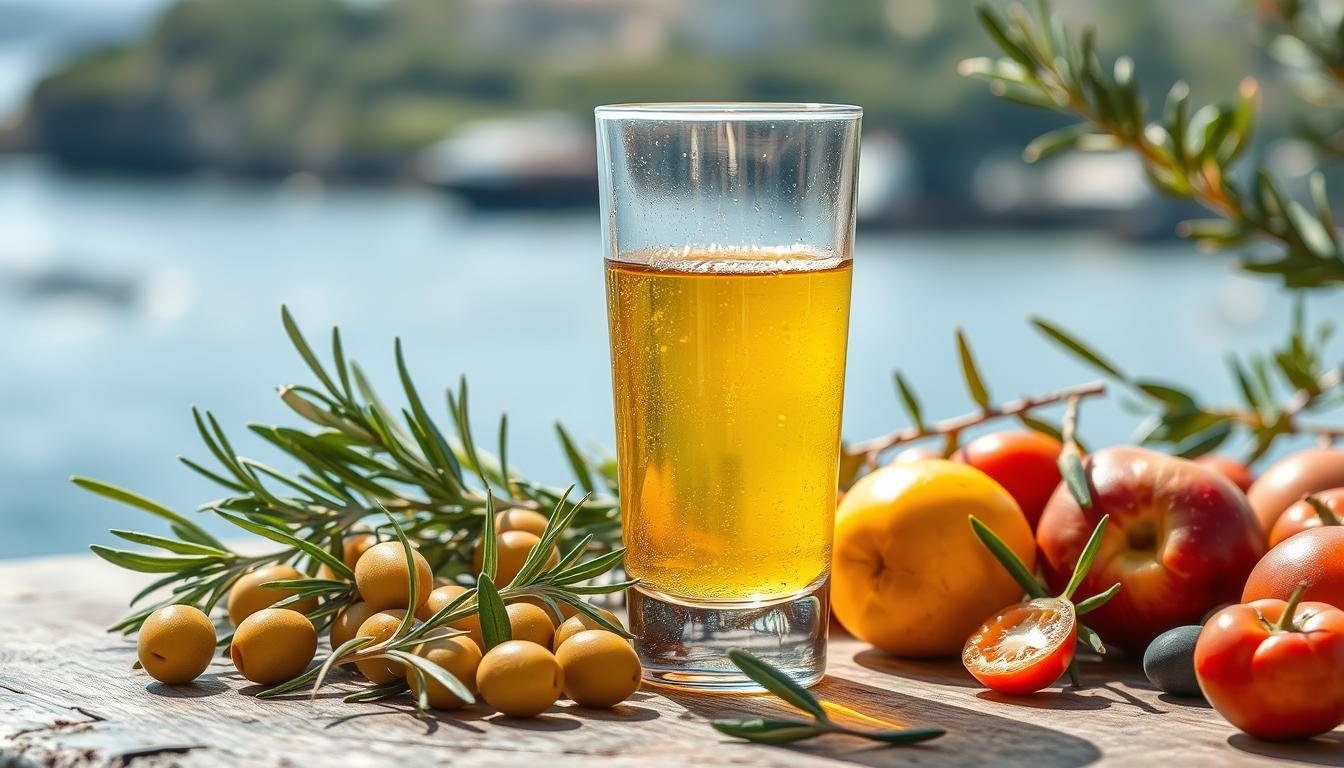Start a flavorful journey through Mediterranean cuisine with olive juice. This versatile ingredient adds depth and authenticity to many dishes. It comes from the ancient process of olive oil production.
Olive juice brings a unique and captivating taste. It’s celebrated in the Mediterranean’s culinary traditions.
Whether you’re a seasoned chef or a home cook, olive juice can make your dishes better. It infuses them with the rich, vibrant flavors of Mediterranean gastronomy. Use it in savory stews, roasted vegetables, dips, and marinades.
This liquid gold from olive groves can change your dishes. It takes your taste buds to the Mediterranean’s sun-drenched coasts and rolling hills.
Table of Contents
Key Takeaways
- Olive juice is a versatile ingredient with origins in traditional Mediterranean olive oil production.
- It offers a unique and authentic taste that enhances a wide range of dishes in Mediterranean cuisine.
- Olive juice can be used in a variety of culinary applications, from savory stews to marinades and dips.
- Incorporating olive juice into your cooking can transport you to the flavors of the Mediterranean region.
- Olive juice is a valuable addition to any kitchen, whether you’re a professional chef or a home cook.
Understanding Olive Juice: From Grove to Glass
Olive juice is a favorite in the Mediterranean. It starts its journey in olive groves and ends up in our glasses. Let’s explore how these simple fruits become the vibrant, tasty liquid we love.
Traditional Harvesting Methods
In olive-producing areas, harvesting is a cherished tradition. Skilled workers pick olives by hand, choosing the ripest ones. This careful picking keeps the flavors and scents of the olives intact.
The Art of Olive Pressing
After picking, the olives are pressed. Olive pressers use old methods or new machines to get the juice. They press gently to keep the juice’s flavors and aromas.
Brine Preparation Techniques
The last step is making the olive brine. Growers mix salt, water, and sometimes herbs to enhance the juice. This mix brings out the olives’ true taste.
From the groves to the bottles, each step makes olive juice special. It’s a journey that turns simple olives into a complex, delicious Mediterranean drink.
Mediterranean Culinary Applications
Olive juice is at the heart of Mediterranean cooking. It’s found in many dishes, from Spanish tapas to Greek salad dressings and Italian antipasti. This ingredient brings authenticity and depth to these flavors.
In Spanish tapas, olive juice adds fruity and slightly bitter notes. It’s used on seared Ibérico ham, marinated olives, and roasted peppers. This makes the flavors of Spanish tapas even more appealing.
Greek salad dressings use olive juice for its rich, peppery taste. It mixes well with tomatoes, cucumbers, feta, and herbs. This creates a perfect blend of flavors that goes well with fresh produce.
In Italian cuisine, olive juice is key in making antipasti. It connects the flavors of marinated artichoke hearts and roasted red peppers. This makes Italian antipasti hard to resist.
| Dish | Role of Olive Juice | Flavor Profile |
|---|---|---|
| Spanish Tapas | Enhances balance and depth | Fruity, with subtle bitterness |
| Greek Salad Dressing | Lends distinctive character | Rich, peppery notes |
| Italian Antipasti | Unifies diverse flavors and textures | Versatile and complementary |
Olive juice is a key ingredient in Mediterranean cooking. It makes many dishes more flavorful and enjoyable.

Health Benefits and Nutritional Value
Olive juice is a key part of Mediterranean cooking. It’s not just a cooking tool but also a health powerhouse. This golden liquid is packed with important minerals and vitamins, making it a nutritional treasure.
Essential Minerals and Vitamins
Olive juice is full of essential nutrients. It’s a great source of vitamin E, which is good for your skin and immune system. It also has vitamin K, important for blood clotting and bone health.
It’s also rich in monounsaturated fats, like oleic acid. These fats are good for your heart and help control cholesterol.
Antioxidant Properties
Olive juice is known for its high antioxidant content. It’s full of polyphenols, which fight off harmful free radicals and protect cells. This can help lower the risk of diseases like cancer and heart disease.
Digestive Health Advantages
Olive juice is also good for your digestive system. Its healthy fats and fiber help with bowel movements and gut health. Its anti-inflammatory properties may also ease symptoms of digestive issues.
Adding olive juice to your diet can boost your health and culinary experiences. It’s a key part of Mediterranean cuisine and olive oil production. Enjoy its fresh taste and nutritional benefits.
Pairing Olive Juice with Mediterranean Dishes
Olive juice is a treasure from the Mediterranean. It brings fresh, bold flavors to many dishes. You can use it to garnish a martini, add flair to Spanish tapas, or make a zesty Greek salad dressing.
As a martini garnish, olive juice adds a savory, briny taste. It pairs well with gin or vodka, making a refreshing cocktail perfect for summer. For Spanish tapas, it’s great in marinades, dips, or drizzled-over grilled foods. It matches the bold, smoky flavors of the region.
In Greek salad dressings, olive juice is a star. Its peppery taste and bright acidity balance the creamy feta, juicy tomatoes, and crisp cucumbers. This makes the salad both refreshing and fulfilling.
| Dish | Olive Juice Pairing | Flavor Profile |
|---|---|---|
| Martini | Garnish | Savory, briny |
| Spanish Tapas | Marinade, dip, drizzle | Bold, smoky |
| Greek Salad Dressing | Key ingredient | Peppery, bright acidity |
Olive juice opens up a world of flavors, taking you to the Mediterranean. Try it in your dishes and find new ways to enhance your favorite Mediterranean recipes.

Olive Juice in Modern Cuisine
Olive juice is now a key player in the world of food and drinks. Chefs and mixologists love its unique taste. They use it in many new dishes and drinks, making food more exciting.
The taste of olive brine adds a special touch to food. It’s used in marinades, dressings, and sauces. This makes Mediterranean cuisine even more interesting with bold flavors.
Mixologists also find olive juice useful. They use it to make antipasti-inspired cocktails. The briny taste of olive juice goes well with spirits and botanicals, making drinks special.
| Dish | Olive Juice Incorporation |
|---|---|
| Grilled Octopus with Olive Brine Vinaigrette | The briny, tangy notes of the olive juice complement the tender octopus perfectly, creating a harmonious balance of flavors. |
| Olive Juice Martini with Pickled Vegetables | The olive juice adds a savory depth to the classic martini, while the pickled vegetables provide a crunchy, acidic contrast. |
| Olive Juice Risotto with Roasted Tomatoes | The creamy, umami-rich risotto is elevated by the addition of olive juice, which lends a delicate brininess to the dish. |
The use of olive juice in food and drinks is growing. Chefs and mixologists keep finding new ways to use it. They make dishes and drinks that show off olive juice’s amazing taste and versatility.
Conclusion
Olive juice is a true gem of Mediterranean cuisine. It adds flavor to many dishes. From traditional harvesting to modern uses, it’s a key ingredient.
It’s also packed with health benefits and nutrients. This makes it great for those looking for natural, antioxidant-rich foods. Adding olive juice to Mediterranean dishes or modern recipes can enhance flavors.
Whether you love cooking at home, work as a chef, or just enjoy food, try olive juice. It can change how you experience food. Let it open the door to the delicious, authentic tastes of the Mediterranean.

